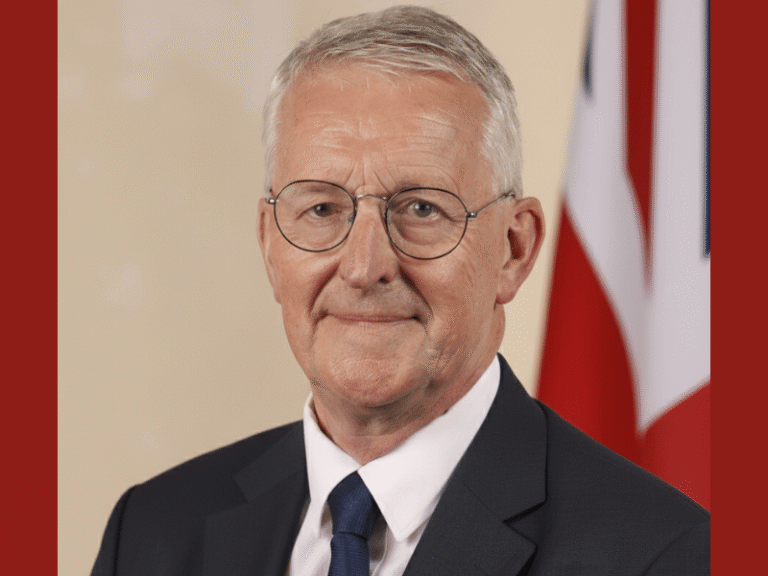In British politics, Hilary Benn is well-known as a respected and dedicated public servant. As a popular MP, he continues to work hard and serve with purpose. Many people are curious about Hilary Benn’s net worth and how his father, Tony Benn, helped shape his path. This article explores his life, career, finances, and the influence of his father’s legacy. Each section uses clear and simple language so that every reader can easily follow and understand.
Hilary Benn Early Life and Background
Hilary James Wedgwood Benn was born on November 26 th 1953 in Hammer smith, London. He grew up in a family that discussed politics and ideas every day. His parents were the United States of America educationalist Caroline Benn and the renowned statesman Tony Benn.
From early on, Hilary saw that public service was part of his family. Tony Benn was an old government servant. Hilary also studied at Norland Place, Westminster Under School, and Holland Park School. He later pursued Russian and Eastern European Studies at the University of Sussex where he graduated in 1974.
He had siblings growing up: a brother Stephen, a sister Melissa and another brother Joshua. The Benn household regularly served politics on its menu—not as a subject, but as a way of life.
Political Journey and Rise
Entry into Politics
After university, Hilary Benn worked as a researcher with trade unions ASTMS and MSF. He joined the Labour Party’s internal finance panel in 1980. He had tested his political ambition towards the end of 1970s and the start of 1980s. Hilary Benn contested the 1983 general elections and 1987 general elections at Ealing North. The Conservative, Harry Greenway, defeated both of these efforts.
In 1979 Benn joined Ealing Borough Council. After that he joined that council as Deputy Leader between 1986 and 1990. In the same years, he also served in the local and regional associations regarding education and planning.
Becoming a Member of Parliament
It was the breakthrough in 1999. The party held a by-election after Leeds Central MP Derek Fatchett died. Benn was up and became the Leeds Central MP on June 10, 1999. He declared his freedom in the inflexible labels, by saying at the time, a Benn, though not a Bennite.
He served several terms for Leeds Central following which boundary changes brought his 2024 election in Leeds South.
Duty and Influence of Ministries
Hilary Benn became more responsible and his career took off. He joined Parliamentary under-secretary of International development between 2001 and 2002. In 20022003, he took over Home Office Prisons and Probation.
He was made Secretary of State for International Development, a ministerial post, in October 2003. Managing overseas relationships, disaster relief, and assistance initiatives fell to him.
Benn was named Secretary of State for Environment, Food and Rural Affairs in 2007 when Gordon Brown assumed office as Prime Minister. He fought problems like bovine tuberculosis in British cattle and supported the 2008 Climate Change Act in that capacity.
Benn held many shadow cabinet posts after 2010 when Labour went into opposition, including Shadow Foreign Secretary from 2015 to 2016. In December 2015, he split with his party leader at the time and gave a strong speech in the House of Commons advocating aerial attacks against ISIL in Syria.
In 2016, he became the chair of the Exiting the European Union Select Committee, then the Committee on the Future Relationship with the EU. After Labour’s electoral victory in 2024, he became the Secretary of State for Northern Ireland. In 2023, he had served as the Shadow Secretary of State for Northern Ireland.
Role as Hilary Benn MP
Serving Constituents & Parliament
He has consistently and clearly supported his constituents as Hilary Benn MP. Benn kept faith and was reelected several times following Leeds Central victory in 1999. He succeeded Leeds South as MP following border adjustments in 2024.
Parliamentary debates, committee work, and legislation all involve him. Acting as committee chair during Brexit talks put him smack in the middle of one of the most trying periods in British history.
Significant Problems and Activities
Benn has supported sensible food policy, environmental initiatives, sustainable agriculture, and climate change mitigation. As International Development Secretary, he advocated robust British participation in foreign aid, disaster relief, and world collaborations.
He also adopted positions occasionally at odds with party lines. One example of that independence is his 2015 speech on Syria. In the Brexit era, he aimed as committee head to protect British interests and parliamentary oversight.
Political stability, carrying out the Windsor Framework, and cooperation with local governments are among his current efforts in Northern Ireland.
Hilary Benn Net Worth and Finances
Whereas Hilary Benn is outspoken about his position, he is more secretive as far as finances are concerned. There is no accurate or current source that documents the exact value of Hilary Benn net worth.
He has worked as an MP and a minister, two positions which are well paid with pensions. These income sources form part of his wealth.
Reports suggest that at times he benefited financially from family gifts. For example, sources close to him claimed his stake in some property was boosted via a gift from his father, Tony Benn. Nevertheless, it is not clear and speculative which value is exact.
His openness on the financial front is bounded by the restrictions on disclosed information to the general public, and privacy standards. What is public is his declared interests in Parliament, roles in trusts, and past directorship records.
While many politicians publish detailed annual statements, Hilary Benn net worth continues to be more discussed in media speculation than in precise data.
The Legacy of Hilary Benn’s Father
Who Was Tony Benn?
One of the most influential politicians on the left in Britain was Tony Benn (19252014). He was a Member of Parliament for almost fifty years and a cabinet member in the 1960s and 1970s. He was born in a family of Liberal origin, and later adopted the Labour party and was the strong advocate of democratic socialism.
Almost uniquely, Tony Benn campaigned to give people the power to renounce peerages so he could stay in the Commons. That led to the Peerage Act 1963. Throughout his career, he was against privatisation, he defied party leadership, and he advocated a greater level of grass-root democracy.
Influence on Hilary Benn
As a young girl, Hilary saw how his father was obsessed with serving the people. That defined his perception of politics as a vocation. He inherited a respect for rigorous debate, strong preparation, and consistency.
Yet Hilary made clear he would not simply follow in Tony’s footsteps. He preferred to carve his own path. That is why he often said he was “a Benn, but not a Bennite.” Where Tony leaned very far left, Hilary sometimes positioned himself more to the center.
To the analysts, Hilary is more consistent and methodological in his manner as compared to his fiery father. Such differences enable him to cut across the divides within his party and the political spectrum.
Similarities & Differences
Similarities:
- Both valued clear ideas, public debate, and strong moral purpose.
- Each engaged in long political service, caring about justice, equality, and institutions.
- The unpopularity did not stop them both being committed to giving their mind.
Differences:
- Tony Benn was more radical, and confrontational; Hilary usually begins within the system.
- Hilary has accepted compromises more often; Tony preferred principled stances even at personal cost.
- Hilary maintains a more moderate tone in many public debates, seeking balance.
In sum, Hilary Benn carries his father’s legacy — but on his own terms.
Personal Life, Character & Values
Hilary Benn has a grounded life out of politics. In the year 1982, he got married to his second wife, Sally; they have four children. His marriage to Rosalind Retey ended because of her death.
He is simple in his lifestyle. He is a teetotaller and a vegetarian – both of these are options that are in line with his moral principles. Hilary Benn is also mentally engaged in writing, reading and making well-planned speeches.
Colleagues often mention his calm manner, steady voice, and approachability. He is seen as a listener, someone who weighs views before speaking. Those attributes assist him to speak and arbitrate various views.
He believes in the ideals of fairness, common good, and long-termism. He tends to select political choices not as temporary victories, but long-term effects.
Public Image, Challenges & Vision
Public Perception
To many, Hilary Benn is viewed as a dependable politician. His orations are not dramatic. He is admired as a person with integrity and hard working. Even non-allied members of parliament came to cheer him during the Syria debate in 2015. Critics argue that he is not charismatic or bold enough like these flashier individuals.
Within his own party, he is often regarded as cautious; however, many also view him as a bridge between the left and the centre. His independence of thought, meanwhile, continues to earn him both praise and occasional tension.
Challenges
One major challenge is navigating party factions. He has had to balance ideals with party discipline. The Syria stance is an example: it cost him his Shadow Foreign Office role under Jeremy Corbyn.
Another challenge is public expectation. Being Tony Benn’s son raises scrutiny — people watch more closely. He must show he is his own person.
Additionally, issues like Brexit and Northern Ireland are complex; they test any politician’s skill. He must deliver results and maintain trust.
Vision for the Future
Unity, social justice, and sustainable development are frequently mentioned by Hilary Benn. He stresses that politics has to fix actual issues: inequality, social cohesiveness, and climate change. His knowledge gained from Northern Ireland, development experience, and environmental experience gives him wide vision.
He hopes to bridge ties with forgotten neighborhoods and assist the UK get a solid basis following Brexit. He should support governance, tackle historical legacies, and advance trust in Northern Ireland.
His vision is anchored in public service rather than flamboyant. He frequently argues good governance calls for listening, humility, and meticulousness.
Conclusion
Hilary Benn has the experience of a person born into a political family; however, he decided to respect that heritage while creating a new meaning for his own life. As Hilary Benn MP, he has been consistent, intelligent, and committed throughout his career. Moreover, the issue of Hilary Benn’s net worth is largely personal, yet his long record of public service and the positions he has held suggest a well-paid but modest and low-profile lifestyle. Although he was influenced by his father, Tony Benn, Hilary was very much his own making—choosing not to echo his father’s voice but to develop his own.
In modern times, he stands as a transitional figure—moving between conservatism and reform, between idealism and utilitarianism. The story of his life, therefore, teaches us that while legacy holds importance, it is choice that truly defines the individual. Furthermore, in politics, character often speaks louder than pageantry, and Hilary Benn’s journey stands as a powerful example of that enduring truth.


